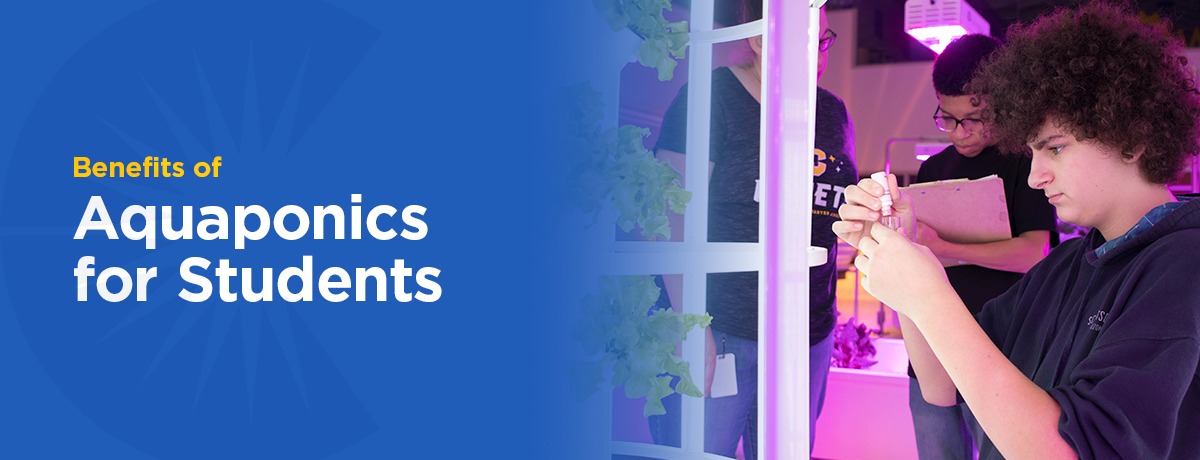Enrollment Now Open for Second Semester. Click Here
Enrollment Now Open for Second Semester. Click Here

Aquaponics is an innovative farming solution that students can experience firsthand at Commonwealth Charter Academy. AgWorks at CCA® includes a one-of-a-kind aquaponics facility located at CCA’s Capital Campus in Harrisburg. This facility gives students the opportunity to get involved in aquaponics, hydroponics, and aeroponics.
Aquaponics is an agricultural method that uses fish waste to grow plants instead of soil. Students learn the importance of aquaponics and valuable skills that will shape their perspective on farming and the environment. It may even inspire their future careers.
Aquaponics sounds fancy, but the concept is quite simple. It’s an eco-friendly alternative to traditional soil gardening. Let’s gain a better understanding of how it works:
In traditional soil gardening, farmers often use fertilizer to supplement vital nutrients, creating toxic runoff that pollutes our environment. Aquaponics allows farmers to cultivate their crops without harming the ecosystem. It’s 90% more water-efficient and lets farmers grow food in areas with harsh climates and poor soil.
Aquaponics is a dynamic process that can teach your child many lessons. It’s a jumping-off point to explore the nitrogen cycle, symbiosis, engineering, and many other engaging topics.
Witnessing these processes firsthand is an exciting way to help your child master these complex ideas. Creating a real-life example of aquaponics at home is simple. The materials for a basic aquaponics system include:
Once your child sets up their garden, they can sit back and witness the beauty of science right before their eyes.
If your child is buzzing over their home aquaponics system, they would be an excellent fit for the CCA aquaponics club. AgWorks at CCA allows students to experience the wonder of aquaponics on a much larger and more advanced scale.
The Aquaponics Club was created to show students what the AgWorks at CCA program has to offer and how they can benefit from it – regardless of where the students live. AgWorks at CCA boasts both a physical lab in Harrisburg and a mobile lab that travels across the state to offer students additional hands-on learning opportunities. Students can participate in three different labs — research and development, tissue culture, and genetics.
The club has multiple CCA teachers serving as advisers spread out between grades K-12:
The club meetings are virtual, and the lab itself has some great technology that allows students to view and use the lab for experiments both in-person and remotely.
The club advisers take students on virtual tours of the lab and set up cameras throughout the facility to aid in the learning process. Because club members will be spread across Pennsylvania, we built a dashboard to monitor plant growth and fertilizer levels in the facility. Students will have the opportunity to observe and track plant growth. They will see how different types and amounts of light affect growth over time using rulers and camera monitoring.
CCA created the Aquaponics Club to teach students a new, sustainable way to farm. By participating in the club, students will see how technology integration creates innovative solutions in the agricultural industry. Sam Johnson, the director of Agworks at CCA, offered several other reasons:
Club advisers plan to work closely with Johnson as they develop AgWorks at CCA. They’ll be hosting in-person club events so students can see the lab and participate in hands-on aquaponics-related activities. These events also give students with similar interests a chance to interact in a social setting.
The Aquaponics Club benefits students in all grade levels by teaching valuable lessons that apply to many other subjects. Here are just a few things they’ll learn:
Participating in the running of a successful aquaponics garden provides learning opportunities in many different fields, such as:
Participating in the AgWorks at CCA Aquaponics Club allows students to practice these skills and explore potential career fields. Students can get involved by joining the Aquaponics Club, volunteering at the facility, attending upcoming events, or applying for an internship at AgWorks at CCA.
Learn more about the Aquaponics Club by exploring their YouTube channel.
With the Aquaponics Club, students have the chance to conduct research that has never been done. They can see the plant and fish life cycle and learn more about the variety of careers that can come from this field.
Is your child interested in getting involved with AgWorks at CCA? Contact us today!
Enrollment Now Open for Second Semester. Click Here